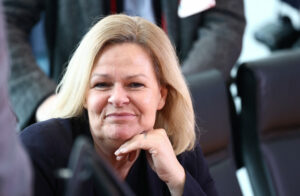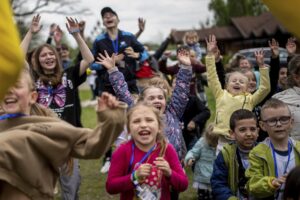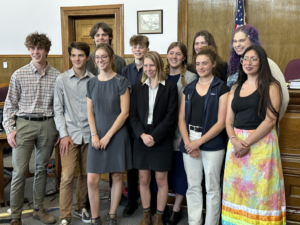Comprised of filmmakers, scholars and mental health workers, Edut 710 serves the dual purpose of helping victims cope with trauma and documenting Hamas atrocities for the future
Sharon Weisberger was watching the sun come up at the Supernova Festival on October 7. Moments earlier, she had a conversation with a photographer about music and love, and how “you only live once, and you have to fulfill your dreams.”
Then everything changed as Hamas terrorists began their brutal attack on the festival, killing 360 people at the nature party and kidnapping 40, some of whom are still being held hostage in Gaza. The festival attack was part of a wider terror onslaught in which thousands of Hamas-led terrorists stormed into Israel from the Gaza Strip by land, air and sea, killing some 1,200 people, most of them civilians, and abducting 253 more to the Gaza Strip.
Weisberger managed to escape, but she’s lost her inner “fire” and she no longer knows if there’s a place in the world for the things she once loved.
A birth at Alumim00:00/04:17
Weisberger is one of the more than 700 eyewitness survivors of the October 7 massacres to give video testimony for Edut 710, the largest grassroots organization of Israeli documentary filmmakers, scholars and mental health professionals who began filming testimonies within a few days of the October 7 atrocities. The group’s name draws from the Hebrew word for testimony and the massacre’s calendar date.
“We realized very quickly that we wanted to record the primary witnesses who were in the firing line,” said Edut 710 cofounder Sagi Aloni. The group has about 400 volunteers involved in the project. Each witness tells a raw, fresh story, adding to a collective outpouring of trauma, fear, uncertainty and survival.
Get The Times of Israel’s Daily Edition by email and never miss our top stories
By signing up, you agree to the terms
“We have to think about the future and how people will try to find proof and deny that the event even happened,” said another founder, Itay Ken-Tor, a documentary filmmaker and producer of the award-winning documentary, “A Film Unfinished,” about a Nazi propaganda film shot in the Warsaw Ghetto.
“Because I have researched the Shoah and collected a lot of evidence, I know the importance of firsthand testimony,” Ken-Tor said. “It’s very important that the quality of our videos are really good so they can be seen in the future, preserved for 100 years.”
The art of listening
Edut 710’s ethos is guided by the teachings of Dr. Dori Laub, a Holocaust survivor who collected testimonies of other survivors and taught the art of listening to people who had undergone trauma.
“We aren’t ‘interviewing’ the survivors,” said Talya Avishai, one of the founders of Edut 710. “We are listening, deeply listening. We aren’t doing anything else. We pay attention. We do it ethically so we won’t hurt people who are still in the midst of their trauma.”

Avishai, who said she has listened to more than 70 survivors, said that the words survivors try to use don’t encompass the depth of their pain.
“We can’t use words that have existed for so long to describe something that never happened before,” Avishai said. She pays attention to a survivor’s tone, body language and looks that have “nothing to do with words.”
“I’m looking in their eyes,” she said. “I’m looking into their souls.”
“They tell their story as part of Jewish history,” Avishai said. “The fact that I sit and listen to them is a success. It’s heartbreaking, but it’s a happy ending because they’re still alive.”

Bat-El Segev, a mother of six, including a one-month-old baby, survived the onslaught in her garden apartment in Sderot. She spoke to Avishai while videographer Kfir Amir filmed her a few months after October 7.
“The days when we are all on a shipwrecked boat, the people of the project are for us an anchor, a listening ear and a refuge for pain,” Segev said afterward. “The very act of talking, telling, listening was a source of finding renewed strength and the first step of returning to life.”
The videos show how “people go from survivors to witnesses,” said Ohad Ufaz, a filmmaker and one of Edut’s founders.

Ufaz directed the movie “The Listener” about Laub, who “enabled Shoah survivors to deliver their testimony and to experience true listening for the first time.”
“We have a protocol at Edut, a method of approaching survivors,” Ufaz said.
“There is a slight risk that we might trigger Post-Traumatic Stress Disorder [PTSD], so we give survivors as much time as they need to lead and witness their own story. We’re very sensitive. We never interrupt.”
Ufaz said that the videos also let survivors introduce themselves as “regular people” who describe their lives and the week before October 7.

Emotional trauma is like a wound, he said, and “a wounded memory is in pieces.” As much as possible, the goal is to help survivors “gain agency over their stories and memories.”
Pay attention and ask no questions
Edut 710 is posting both one-minute and five-minute testimonies on social media and YouTube, as well as full testimonies on its website to combat the denial of the October 7 attacks.
“There is nothing more persuasive and convincing than someone who shares their point of view, going into details that nobody could imagine,” Ufaz said.
Gil Levin, a photographer involved in the project, used to work as a social worker with neglected and abused children. He volunteers at Edut both as a listener, he said, and behind the camera.

“We’ve learned to pay attention and ask no questions,” Levin said. “We don’t push people to talk. We’re not looking for drama.”
Everyone’s story is part of the larger story, from men who were soldiers and first responders to women hiding in safe rooms with their children. A story of a woman who “held onto the door of a safe room so that terrorists couldn’t open it,” revealed her “resourcefulness and determination to survive.”
“Nobody can talk about these atrocities and tell the story except them,” Ufaz said. Alon Davidi, the mayor of Sderot, gave his testimony “as a citizen” to Edut 710 and urged others to do the same.
“It’s very important not only for future generations but for ourselves,” Davidi said.
Dr. Renana Keydar, Assistant Professor of Law and Digital Humanities
at Hebrew University, along with Dr. Yael Netzer, the lead scientist at the university’s Center for Digital Humanities, have volunteered to build a digital archive of Edut 710’s videos that will be stored at the National Library of Israel. The testimonies will utilize sophisticated machine learning and artificial intelligence models to make the project sustainable for future scholars.

Keydar observed that there are close to 100 initiatives all over the country to document what has happened on and after October 7. Growing up in Israel, she said that she grew up hearing testimonies. Every year on Israel’s national Holocaust Remembrance Day, for example, she said, “There was always a witness telling you a story.”
The people listening to the story then helped carry the burden of the story.
Does that have something to do with the role of memory for Jews in their tradition and history?
Speaking with The Times of Israel, Edut 710’s founder Aloni said he believes it does. Even after the pogrom in Kishinev in 1903, Aloni said, there was a researcher gathering testimony.
He let out a sad laugh and added, “I guess we’re experts in grief.”




